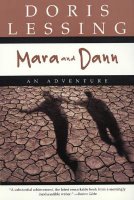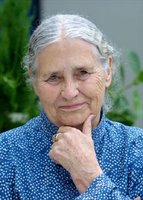
 Doris Lessing's Mara and Dann :
Doris Lessing's Mara and Dann : An Adventure
Doris Lessing's fiction is commonly divided into three distinct phases, The Communist theme: 1944-1956 when she was writing radically on social issues, The psychological theme 1956-1969 and after that The Sufi theme which was explored in the Canopus series. In recent years, Lessing has worked in all three areas. Her 1998 novel, Mara and Dann combines all three of these areas, as well as her experiences on the African veld, into one gripping, page-turning story.
Born Doris May Taylor on October 22, 1919 in Kermanshah, Persia, Lessing's family moved to the British colony of Southern Rhodesia (modern Zibabwe) in 1925. It was her father's idea to farm maize which never worked out to his expectations. Unfortunately, the thousand acres of bush failed to yield wealth, thwarting her mother's desire to live the life of a Victorian in "savage lands". Life on the veld wasn't nearly as exotic or romantic as she had imagined. Despite a difficult and unhappy childhood, Lessing's writings about life in British Africa are filled with a compassion for both the sterile lives of the British colonists and the plight of the indigenous inhabitants. Her African stories are some of her finest work and provide the reader with first hand description of what it was like to live in such a rough and dangerous land, while at the same time shows the great beauty of the African veld and its indigenous people.
Many of Lessing's childhood experiences in Zimbabwe influence her story of Mara and Dann. Even though it is set thousands of years in the future, the brother and sister live in much the same surroundings as Lessing did in her childhood. Drought, large insects, deadly ants, wild beasts, famine challenge these two children on their quest to find the icy North where it is rumoured there is water and enough to eat.
The story of Mara and Dann begins with a power struggle in the land of Ifrik (Africa) and when Mara and Dann are very young. Their parents are killed by the opposition, and the children are taken away and protected, a reason for which we don't find out until the very end of the book. Lawlessness and social disintigration prevail all across Ifrik, and danger awaits the two young people at every turn. Mara takes on a sort of caretaker role for her younger brother, and he is a handful. He often runs off on his own, leaving Mara to worry about him as she herself is trying to survive. But the two find each other again and again and each time they come together their brother-sister bond grows stronger.
The children's journey to the north is filled with danger. Many of these dangers that Lessing creates appear to be exaggerations of the dangers she, herself experienced in the African bush. Whenever there is a sudden and rare flood in the story it is reminicent of the heavy rains on the veld, when animals of all variety come to drink and fight at the watering holes. In Lessing's African stories she often writes of the ants that can consume a body of a deer in a matter of minutes, eating it alive. Ants appear in Mara and Dann as "earth insects" and horned beetles become "water stingers'. There are also oversized scorpions, giant lizards and other creatures who eventually kill off the "milk beasts" (cows) and all sorts of other mutant creatures lurk behind rocks, inside empty cisterns, and any variety of hiding places. But the greatest dangers were the various races of people, who instead of working together to find solutions to the problems they all face, they war against each other, not wanting to help and wanting whatever little resources are left for themselves.
Not only is this an adventure story of survival against all odds, it is also a coming of age story for two young children who grow into strong and steadfast adults. The siblings encounter crime, power struggles, and corruption and learn much about human nature and how societies function. Lessing provides us with a vision of the human condition through this story of imagination mixed with realism. This is a fascinating read. The underlying message is universal. It is a message of hope for a better world.
I wrote my graduate thesis on Doris Lessing and Mara and Dann and I give this novel a rating of 5+ stars. Excellent!



No comments:
Post a Comment